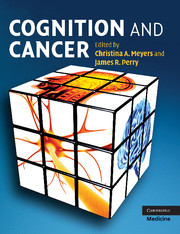Book contents
- Frontmatter
- Contents
- List of contributors
- Preface
- Section 1 Cognition and the brain: measurement, tools, and interpretation
- Section 2 Effects of cancer and cancer treatment on cognition
- 7 Biological bases of radiation injury to the brain
- 8 Cognitive dysfunction related to chemotherapy and biological response modifiers
- 9 Effect of hormones and hormonal treatment on cognition
- 10 Low-grade gliomas
- 11 High-grade gliomas
- 12 Brain metastases
- 13 Primary central nervous system lymphoma
- 14 Childhood brain tumors
- 15 Neurofibromatosis
- 16 Hematological malignancies
- 17 Paraneoplastic disorders
- 18 Symptomatic therapies and supportive care issues
- 19 Animal models and cancer-related symptoms
- Section 3 Interventions and implications for clinical trials
- Index
- Plate section
- References
12 - Brain metastases
Published online by Cambridge University Press: 13 August 2009
- Frontmatter
- Contents
- List of contributors
- Preface
- Section 1 Cognition and the brain: measurement, tools, and interpretation
- Section 2 Effects of cancer and cancer treatment on cognition
- 7 Biological bases of radiation injury to the brain
- 8 Cognitive dysfunction related to chemotherapy and biological response modifiers
- 9 Effect of hormones and hormonal treatment on cognition
- 10 Low-grade gliomas
- 11 High-grade gliomas
- 12 Brain metastases
- 13 Primary central nervous system lymphoma
- 14 Childhood brain tumors
- 15 Neurofibromatosis
- 16 Hematological malignancies
- 17 Paraneoplastic disorders
- 18 Symptomatic therapies and supportive care issues
- 19 Animal models and cancer-related symptoms
- Section 3 Interventions and implications for clinical trials
- Index
- Plate section
- References
Summary
Introduction
Brain metastasis is the commonest intracranial tumor in adults. In the United States, approximately 170 000 patients are diagnosed with brain metastases every year (Greenberg et al., 1999; Mehta & Tremont-Lukas, 2004). The rise in incidence is attributed to a number of factors including increased life expectancy, improved control of systemic disease, and better imaging capabilities that facilitate diagnosis of smaller lesions (Wen et al., 2001). While it is recognized that the overall prognosis of these patients remains poor, newer treatment methods have led to improved survival in subsets of patients. Patients with brain metastases often suffer from a variety of neurological, cognitive, and emotional difficulties. It is known that even subtle impairments of cognitive function can adversely affect the quality of life, an issue that was largely ignored earlier due to the dismal outcome. However, in the changing scenario of improved survival, recognizing the effects of the disease and its therapies on neurocognitive outcomes is important in formulating treatment modifications and strategies for rehabilitation that will enable patients to maximize their functional ability. This chapter briefly reviews the incidence and management of brain metastases as relevant to neurocognitive problems in cancer patients, discusses the etiology and pathogenesis of cognitive deficits in these patients, and suggests preventive and therapeutic strategies based on current understanding.
Overview of brain metastases
Epidemiology
Brain metastasis is a major debilitating complication affecting cancer patients. Autopsy data indicate that approximately 24% of adult cancer patients develop metastatic brain disease during the course of their cancer (Posner, 1995).
- Type
- Chapter
- Information
- Cognition and Cancer , pp. 170 - 186Publisher: Cambridge University PressPrint publication year: 2008
References
- 1
- Cited by



